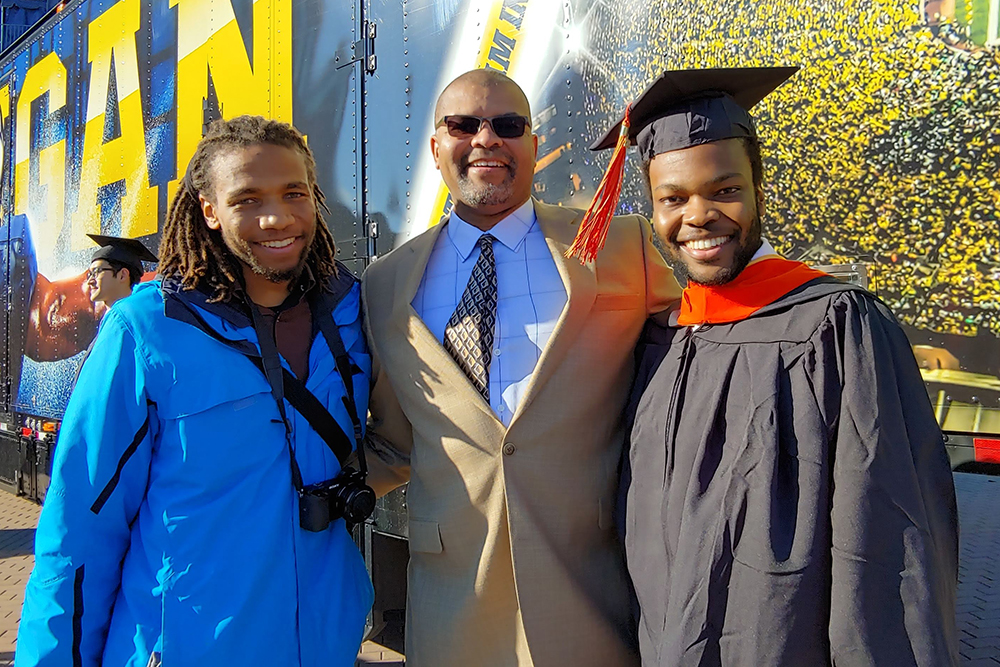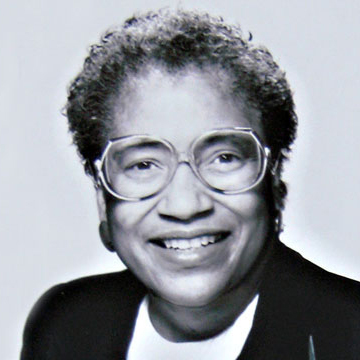Christopher Rutledge honored with the 2023 Willie Hobbs Moore Distinguished Alumni Lectureship
Christopher Rutledge (MS EE), a Distinguished Engineer at Verizon, has been awarded the 2023 Willie Hobbs Moore Distinguished Alumni Lectureship in recognition of his distinguished career. Rutledge’s presentation, “Engineering – The Joy of Journey,” focused on the skills and toolsets engineers need today to effectively tackle some of the world’s biggest and most complex problems.
“If you like to solve problems, if you run toward hard stuff, then you are the chosen folks,” Rutledge said. “We are the intellectual first responders.”
We are the intellectual first responders.
Christopher Rutledge
Rutledge is currently responsible for the development of Verizon’s Mobile Device Management platform, which helps users manage mobile devices and keep mobile data and devices “purposed” and protected. Over a period of five years, the platform grew from six Verizon Business customers to well over 260,000, which included over a half-million students learning remotely during the pandemic.
“Folks I work with love to work the problems and drive the solutions,” Rutledge said. “It’s a passion.”
Prior to Verizon, Rutledge was a member of the technical staff at Bell Labs (known at the time as “AT&T Bell Laboratories”), where he worked on proof of concept and key interference testing for new wireless advanced access technologies. He also designed and built AT&T’s Advanced Communication Labs’ largest real-world HFC test bed, but his favorite project was on ultra-low power optical amplifiers for the Department of Defense.
“We went nuts putting rare earth elements inside of glass fibers,” Rutledge said. “It was the most fun project in the history of my work journey ever.”
While at Bell Labs, Rutledge worked with Jesse Russell, one of the pioneers of wireless technology. Russell played a fundamental role in the development of the modern cell phone, and he has hundreds of patents, including the base station technology that transmits radio wave signals to and from mobile devices.
“He taught me that the journey to get to a place where no one’s ever been involves a lot of smaller steps that teach you the right tools to use,” Rutledge said. “And each step is likely patentable.”
Rutledge emphasized the importance of collaboration and engaging with a diversity of viewpoints. He explained that having a robust personal network helps engineers understand how different issues intersect so they can develop more effective solutions. He also stressed the importance of being able to communicate to both a technical audience and to non-technical decision makers to achieve objectives. Above all, he encouraged everyone to keep learning.
“My grandmother lit a spark in me a long time ago to be curious,” Rutledge said. “She used to say, ‘You learn something new every day. Unless you’re dead.’”
For students and those early in their careers, Rutledge offered this fable:
A bird gets caught in freezing rain and falls to the ground, too cold to fly. A cow notices the bird and turns and drops a cowpie on him. The bird is annoyed, but then realizes the cowpie is warm. Happy that his wings are thawing, he chirps with delight, which attracts the attention of the farmer’s cat. The cat comes over and cleans the bird off. The bird is grateful – but then the cat eats him.
“The lesson here is, not everybody who craps on you or gives you a hard assignment is your enemy,” Rutledge said. “And not everybody who cleans you up is your friend.”
Engineering the family legacy
Rutledge comes from a family of teachers dating back to reconstruction, and his family legacy features pioneers, blacksmiths, and athletes. For Rutledge, knowing one’s family history is important, for it’s about respecting those who came before you.
“My grandmother used to tell us these stories, and I want to acknowledge all my mentors and motivators,” Rutledge said.
Rutledge grew up around farms in eastern Texas, where he enjoyed working with his hands and figuring out how to solve problems.
“If a piece of farm equipment wouldn’t work, you’d hear, ‘Oh, that’s a gremlin,’” Rutledge said. “That ain’t satisfying me. What the heck is a gremlin?”
Rutledge was also a big audiophile, and he was fascinated with record players. One year for Christmas, his father bought him an experiment kit where he got to explore parallel and series electrical circuits and rheostats and spinning fans, which fueled his interest in electronics even more.
“It sparked a big interest of, how does this thing work?” Rutledge said.

Both of Rutledge’s sons followed in his footsteps and studied engineering at U-M. Kwesi Rutledge earned his BS in Electrical Engineering and his PhD in ECE from Michigan (he earned his MEng in ECE from UC San Diego), and he is currently a postdoc at MIT. Lee Rutledge earned his BS and MEng in Computer Science from U-M, and he is currently a software engineer at Qualcomm.
“My dad was a humongous inspiration for myself and my brother when entering into the fields of engineering,” Kwesi Rutledge said. “His stellar example showed me how curiosity about the world could effectively improve it, and he made a point to always make sure that the knowledge he gained was understandable to a wide audience. He impressed many a ‘show-and-tell’ class in my day.”
While there were there many advantages to a U-M education, Rutledge said the key reason he encouraged his sons to choose Michigan was because of the people here.
“Somebody’s got to be there who’s gonna love them,” Rutlegde said. “Because when we left our kids here, one of us was crying from Ann Arbor to Austintown, Ohio. And the other was my wife.”
Rutledge earned his BS in Electrical Engineering from Prairie View A&M University. He holds numerous patents in next generation communications technology. He lives in New Jersey, and in his spare time, he enjoys coaching track athletes.
About Dr. Willie Hobbs Moore

Dr. Willie Hobbs Moore (1934–1994) was the first Black woman at Michigan to earn a BS and MS in Electrical Engineering (‘58 and ‘61), and the first Black woman in the country to earn a PhD in physics in 1972 (which she also earned from U-M). She joined Ford Motor Company in 1977, where she was known for expanding the use of Japanese engineering and manufacturing methods. She was named one of the 100 “most promising black women in corporate America” by Ebony magazine in 1991. Learn more >
The ECE Willie Hobbs Moore Distinguished Alumni Lectureship was established in 2018. It honors ECE alumni from traditionally underrepresented backgrounds who are leaders in their field and serve as role models for the ECE community through their leadership, impact on society, service to the community, or other contributions.

 MENU
MENU 
